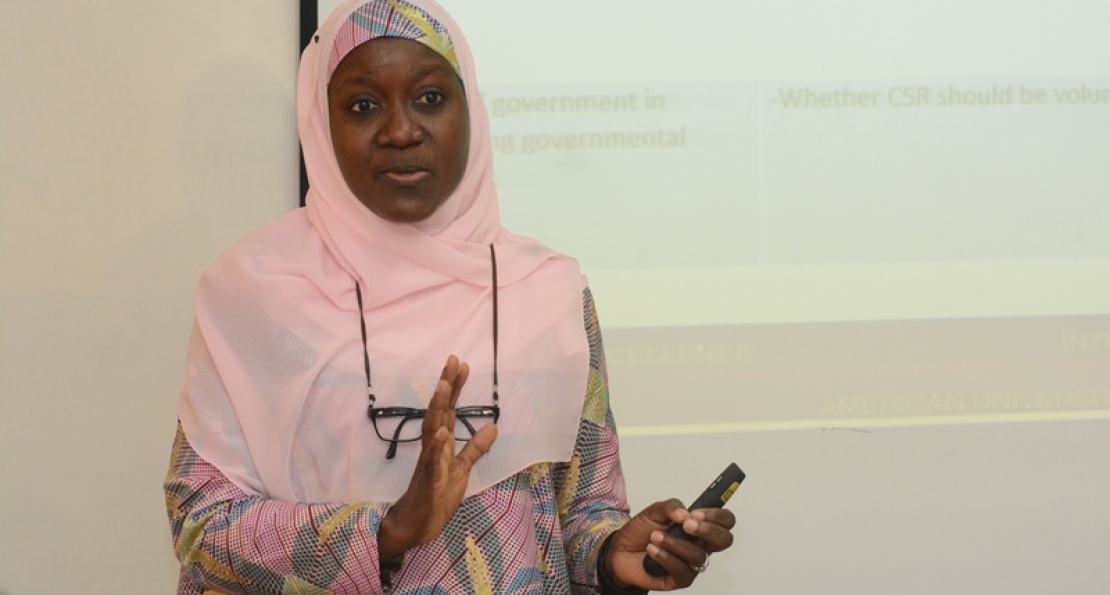On February 7, 2020, Dr. Abiodun S. Isiaka of the School of Business & Entrepreneurship (SBE), discussed the emerging trends, perspectives, and debates regarding the concept of Corporate Social Responsibility (CSR) in Africa.
The presentation is based on a research paper she co-authored with her colleague, Dr. Lukman Raimi, also of SBE.
The purpose of the presentation was to share with the university community their findings, being a work under review in order to emphasize the relevance of CSR in the African context and also get valid input from other professionals.
Dr. Isiaka felt there is a need to understand the agenda, significance, and roles of CSR because, in Africa, it is perceived as a philanthropic act (charity – giving, donations, and expression of empathy to the less privileged in the host community). She noted that companies doing business in Nigeria and Africa now bear the burden of additional responsibilities like building roads, providing electricity, schools, health centers, potable water and empowering vulnerable groups.
“It is essential to incorporate CSR in the academic curriculum to enable our youths to get the basics right from the grassroots before they start to think of setting up a business.”
However, a country’s CSR determinants comprise economic, legal, societal and environmental factors. And of these factors, environmental CSR which is very important in terms of sustainability is given less priority in Nigeria, she added.
Dean of SBE, Professor Attahir Yusuf, commended the research paper and quality of presentation, adding however that CSR should not be considered a voluntary activity in any country be it locally or internationally for the fact that corporate organizations are extracting wealth from society.
“In Africa, especially the oil-producing areas, CSR is an expectation to be met, not a voluntary act, due to the environmental degradation and hazard caused by multinational firms’ exploration for profits.”
Dean of Graduate School, Professor Chris Mbah, acknowledged that African countries should define their CSR based on current problems and it should be made mandatory for all organizations in respective countries across the continent.
Other contributors include Professor of Marketing and former dean of SBE, Linus. Dr. Linus Osuagwu, who commended the authors for their extensive work and urged them to take advantage of suggestions from the floor. Associate Professor of Marketing Communications and Director, Office of Academic Planning and Quality Assurance, Dr. Samuel Tesunbi, emphasized the comparative advantage to companies that prioritize conscionable business culture, environmental sustainability, and pro-people policies.
Executive Director of Communications & Publications, Daniel Okereke, suggested a redefinition of CSR to capture the management of expectations from the society considering that business corporations have same responsibilities as ordinary citizens in terms of compliance with extant domestic rules and regulations including labor laws, payment of taxes, environmental sustainability and, most importantly, making profits to grow the national economy.
“Nigeria is a signatory to international conventions on sustainable environment and ethical governance. All new companies are required by law to conduct Environmental Impact Assessment (EIA) on the expected impact of their activities before opening a shop in Nigeria. EIAs are comprehensive and go beyond protecting the physical environment to cover economic and socio-cultural impacts. Companies doing business in Nigeria need not do more than being legally responsible to meet basic CSR benchmarks.”
An instructor with the Academic Advising and Retention unit, Shittu Ayodeji, who teaches CSR promised to convince students enrolled in his class to attend the seminar as the topic relates to what they learn.
The seminar highlighted diverse perceptions about the definitions and motives of CSR across countries due to historical contexts, cultural norms, and managerial philosophies.
Reported by Rofiat Adekunle


